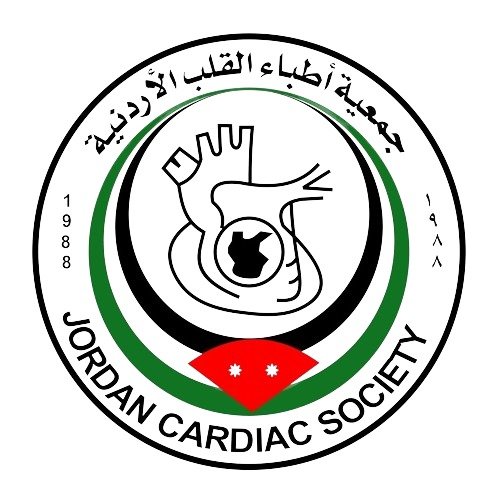A Detailed Overview of the Jordanian Cardiac Society
The Jordanian Cardiac Society (JCS) stands as one of the most significant medical and non-profit health organizations in Jordan. It serves cardiologists within the kingdom and the Arab world, as well as the general public. The association encompasses various specialized working groups focusing on key cardiology fields, including interventional cardiology, heart failure, electrophysiology, valvular heart disease, hypertension, amyloidosis, and advanced cardiac imaging techniques like nuclear, magnetic, and echocardiography imaging
Objectives of the Jordanian Heart Association
Enhancing Physicians’ Skills
JCS is committed to improving the skills of cardiologists by modernizing education and training systems to ensure adherence to best practices in cardiology and cardiovascular medicine. The JCS society serves as a national reference with a team of highly skilled experts in various cardiology specialti

Supporting Scientific Activities
The JCS provides equal opportunities for continuous education and training to cardiologists, improving their skills and knowledge of the latest technologies and research. This includes participation in periodic conferences, workshops, and scientific meetings. JCS also supports young talents and students interested in cardiology
Collaborating with Universities and Official Bodies: JCS works with governmental and health authorities to develop appropriate health policies and improve cardiac care services. It continues to offer expertise and consultation to institutions aiming to educate and develop medical staff
Encouraging Research: JCS promotes applied studies on cardiovascular diseases and organizes conferences and workshops to disseminate research findings
:Community Engagement
The association actively raises public awareness about heart diseases and their prevention through regular information campaigns
Fostering Medical Innovation: Jordanian cardiologists have excelled globally, particularly in pioneering non-surgical valve replacement procedures (TAVI) and complex aortic procedures through catheterization. The country has also made significant strides in valve repair and replacement through cardiac catheterization or even minimally invasive surgeries
Advanced Diagnostic and Therapeutic Capabilities
The JCS boasts advanced facilities for diagnosing and treating a range of heart conditions using state-of-the-art technology like cardiac MRI, CT, and nuclear imaging. Jordanian doctors are adept at performing high-risk arterial or complex coronary procedures through cardiac catheterizations and utilizing ultrasound during procedures
Cutting-Edge Treatment Facilities
Jordan offers specialized centers for diagnosing and treating hypertension and amyloidosis, with cardiologists proficient in managing electrical heart disturbances and heart failure. The country’s facilities are equipped with advanced technology for monitoring and treating varieties of irregular heartbeats.
Comprehensive Cardiovascular Services
A-JCS provides complete cardiovascular services, including interventional treatments for peripheral and cerebral arteries, diagnostic and therapeutic catheterizations, and support devices for heart and circulatory systems. Jordanian facilities are also capable of closing congenital heart defects and offering sophisticated treatments for high-risk heart conditions
B-Promoting Advanced Medical Training and Research
The JCS prioritizes training for both doctors and specialized nursing staff. It encourages the establishment of training programs for cardiology nurses and supports the integration of advanced equipment in hospitals for efficient patient management. JCS emphasizes the importance of building a future that benefits all healthcare stakeholders
Achievements of Jordanian Doctors, Especially Cardiologists, Over the Past 50 Years
In the following article, we summarize the remarkable accomplishments achieved by Jordanian doctors, particularly cardiologists, over the past five decades.
There is no doubt that the improvement in healthcare services has led to tangible results on the health of citizens, which is reflected in the enhancement of general health indicators. Notably, the infant mortality rate has significantly decreased due to the availability of maternal and child care services, the widespread immunization programs, and the availability of vaccines for all communicable diseases that have modern medical solutions
The life expectancy of citizens has risen from 57 years in 1975 to 72 years during the last decade. We also must not forget the spread of medical education, both in terms of graduating general medical practitioners and specialists in most medical fields. There has been an expansion into specialized medical disciplines that did not exist previously, alongside the presence of specialized nursing staff and supportive medical professions such as physical therapy, radiology, pharmacy, and pharmaceutical manufacturing. The focus on training programs for doctors has also contributed to the development of healthcare services, elevating Jordan to a high standing in medicine and earning it the top rank in medical tourism, along with unprecedented achievements such as
The first open-heart surgery in the Arab countries in 1970-
The first kidney transplant in 1972-
The first balloon angioplasty in 1985-
:The first heart transplant in 1985-
(making Jordan the tenth country in the world and the first in the Third World- to achieve this)
The first in vitro fertilization (IVF) procedure in 1982-
The first cardiac stent implantation in 1995-
The first heart and lung transplant in 1997-
The first cochlear implant in 1998-
The first liver transplant in 2004-
The first stem cell transplant in 2009-
These milestones underscore the significant advancements and dedication of Jordanian medical professionals in improving healthcare and achieving excellence in the medical field
Conclusion
The Jordanian Cardiac Society (JCS ) remains dedicated to advancing cardiology practices through continuous education, innovative research, and community engagement. Its efforts not only improve the skills of medical practitioners but also significantly enhance the quality of cardiovascular care available to patients in Jordan and the broader Arab region
For more information, contact the association at +962 7 9500 1983 or +962 7 8082 2707

